Right now my BMW i3 is basically receiving an IV drip. A bottle, taped to a ladder, is feeding 75W85 gear oil into my differential at a hilariously low rate. I suspect the oil infusion will be completed at some point in the next three hours, and it’s all because BMW deleted the fill plug.
I’ve written about the whole BMW i3 fill-plug fiasco in my appropriately-titled piece “BMW Deleted The Fill-Plug From The i3 Leaving Owners With No Way To Change The Gear Oil: A Rant Against ‘Technical Cost Reduction’ And ‘Filled For Life’ Gearboxes.” Basically, BMW, like many other automakers, has decided not to prescribe an oil change interval for the BMW i3’s rear differential — that is to say, BMW considers it a “Filled For Life” gearbox.
This means, in theory, that you never have to change the gear oil, provided your definition of “life” is whatever BMW engineers decided it is, and provided your driving conditions aren’t more extreme than whatever the car was designed for and provided you don’t have any bad seals/water intrusion incidents that might contaminate the fluid. (More on this later in the article).
I hate the concept, though I’m not so naive to think that I’m smarter than BMW engineers. They decided that, for the vast majority of drivers and driving conditions, the rear diff will last the design-life of the car (150,000 miles or whatever) and well past the warranty period. Thus, it’s best not to risk the possibility of someone doing a fluid change and adding contaminants or using the wrong fluid, possibly necessitating a warranty payout.
Still, I don’t care about that (and also, I bet most BMW engineers would agree with me here; this was likely bean-counter choice). Just knowing that the life of my differential, under normal usage (i.e. no catastrophic damage from me hammering on it), is related to the fluid quality makes me want to change that oil regularly. I want my BMW i3 to last 300,000 miles, not just 150,000. More importantly, just look at how much fluid I drained out of my differential, whose capacity BMW lists as 500 mL?

What the hell?! Yes, my i3 is on ramps, but everyone drains their i3’s diff on ramps, and they all seem to drain about the 500 mL that BMW says should be in there. Why did I only have 300 mL of black fluid in my diff?
See, this is my point. This is why all gearboxes should be serviceable. Because of stupid stuff like this. A refillable gearbox gives me peace of mind knowing my car has the best shot at living a long, prosperous life, and that the fluid is 1. The right level 2. not contaminated and 3. the right fluid type.
Its’ also just the principle of the matter. All 2014 BMW i3s had both a drain and fill plug in their differentials, and then in 2015 BMW deleted the fill plug. BMW had the casting right there for a fill-plug equipped differential case, and THEY went out of their way to make a new one without a plug. This is maddening.
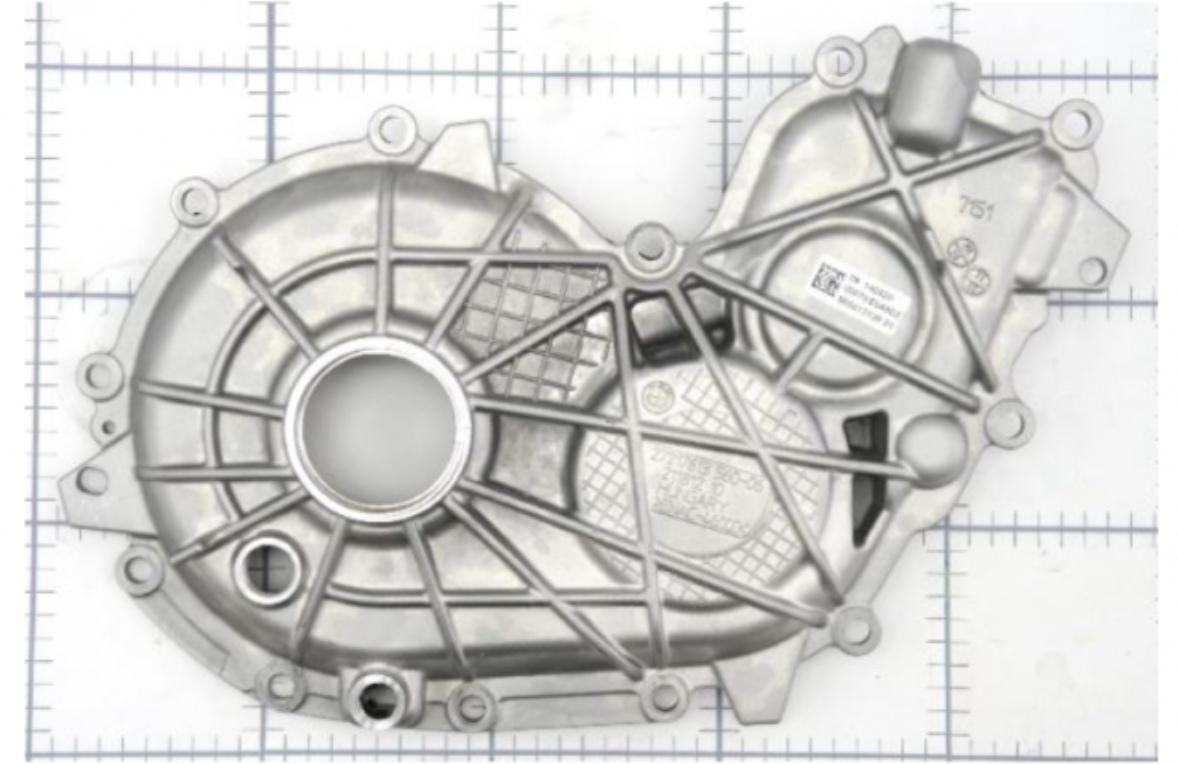
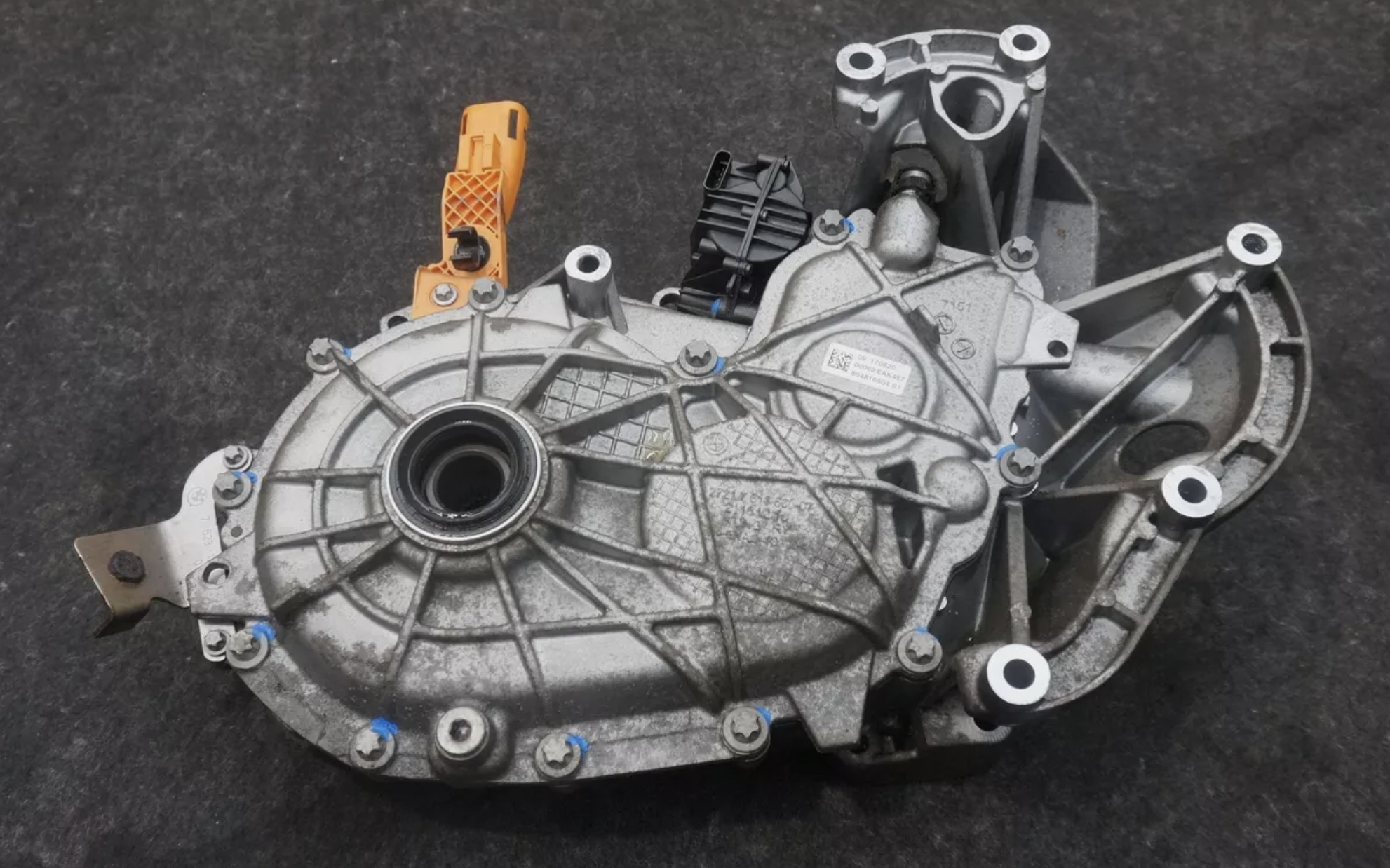
Anyway, I used to own a 2014 BMW i3, and since it was the only year with the fill plug, my drain-and-fill process was a breeze. But it’s not like my fluid, at 140,000 miles, was perfectly clean. Have a look:
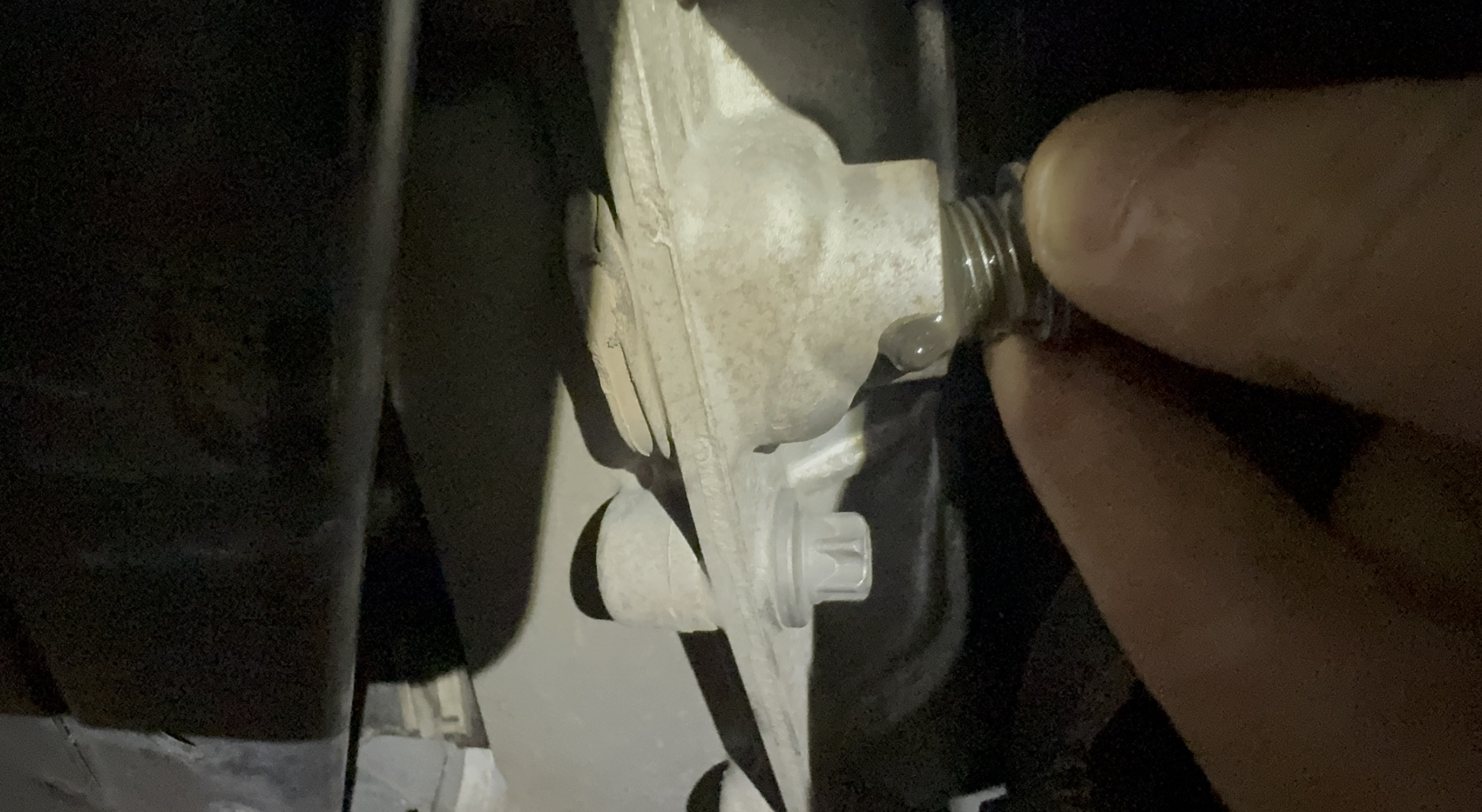

To be sure, once the sludge was out of the bottom of the case and off the magnetic fill plug, the rest of the oil looked pretty decent:
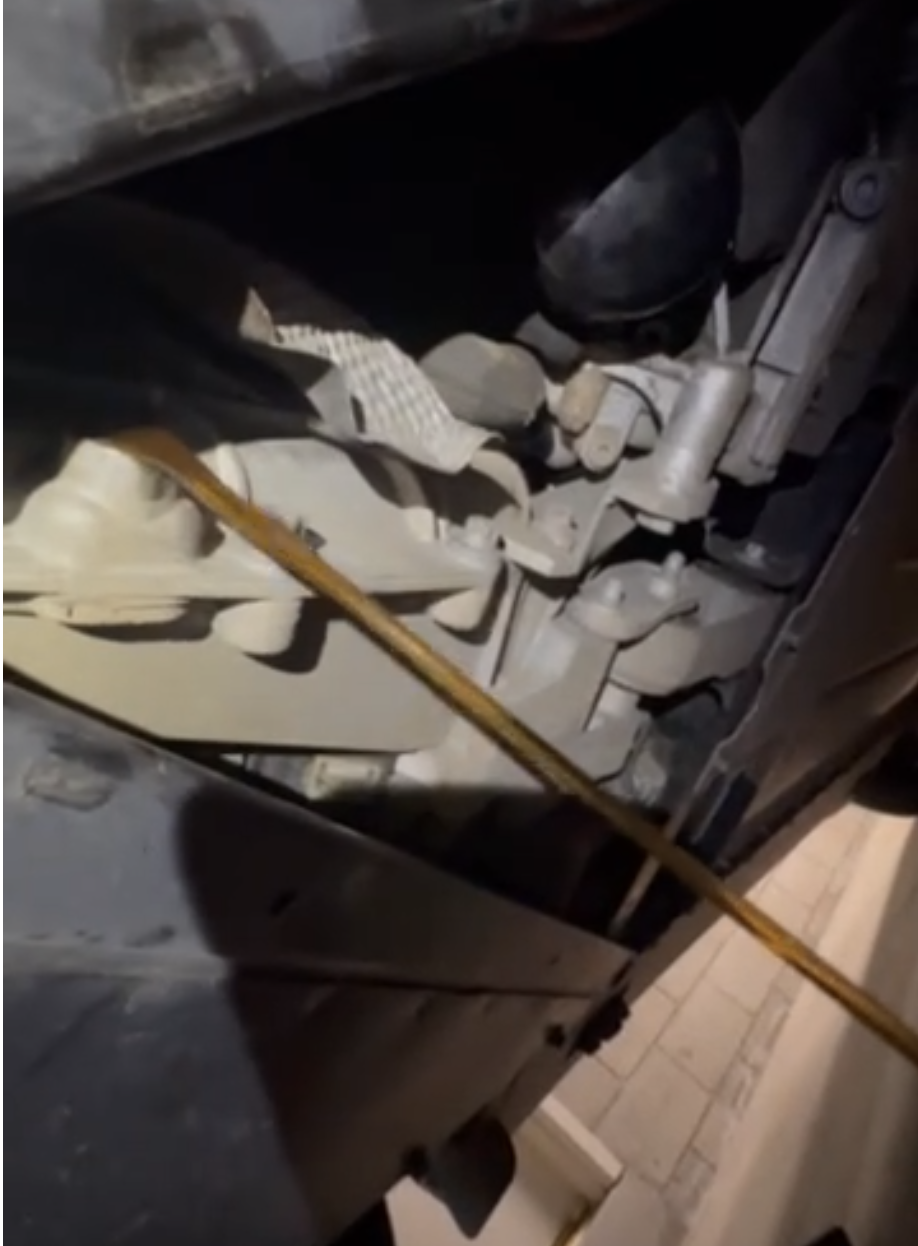
Still, I’m changing one’s automotive fluids is an inalienable right, and one that I am attempting to exercise on my 2021 BMW i3S — a vehicle with no fill plug. How, you may wonder, am I going to pull that off without flipping the car upside down? Well, BMW’s official recommendation when a technician has to fill the differential for whatever reason (perhaps it’s a newly installed unit) is to actually fill the case through the axle shaft hole.
But you know there’s no chance I’m yanking a CV axle just so I can fill this transmission. That would take forever. What some people do is they wrap a hose in electrical tape until it fills the drain plug hole, then they pump oil through that hose and into the differential, after which they yank the hose and quickly install the plug, ensuring they’ve pumped enough oil to account for spillage.
This sounds like a mess, so what a BMW i3 forum-member with username Pipino did is create a new fill plug. This plug features a threaded center bore, which can be used to fill the differential via a threaded fitting, and then plugged afterwards.
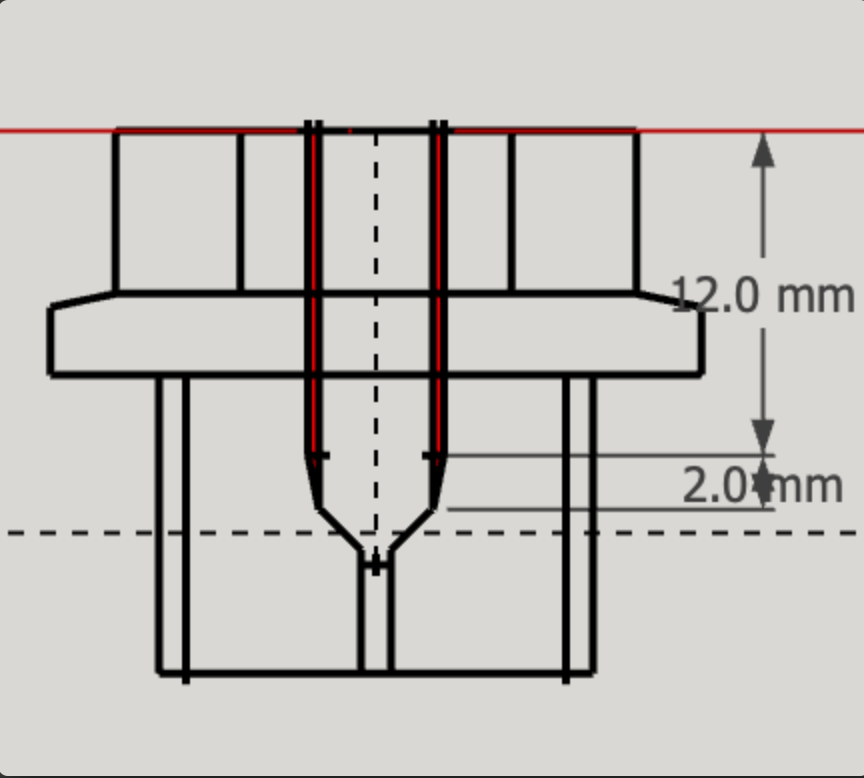
Here you can see the new plug on the right (with its strong donut-shaped neodymium magnet), and the old one on the left:
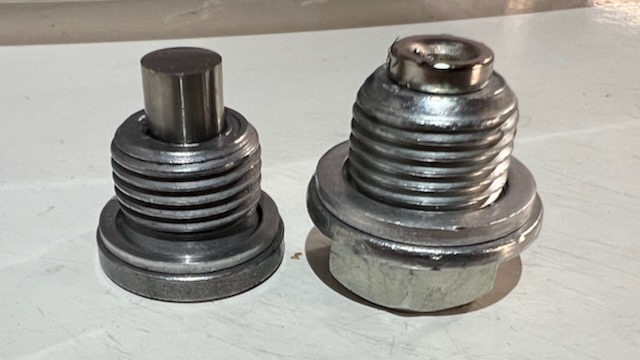
Here you can see the fitting going into that center bore.
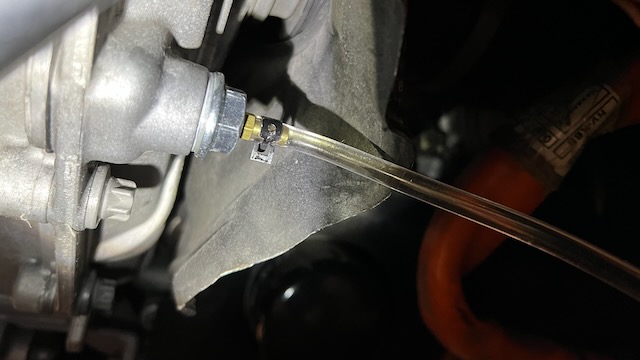
And here’s the grub screw plug for that center bore:
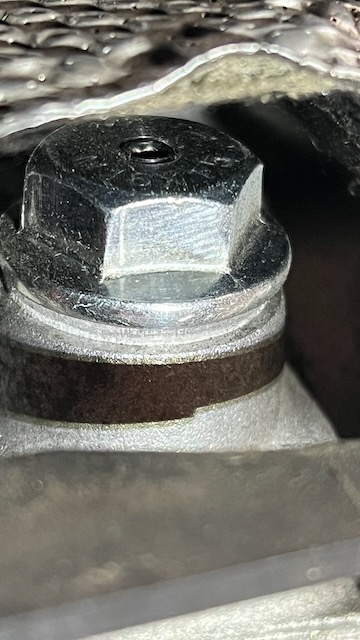
You might be thinking one could just pump the oil in through that center bore, remove the fitting, install the plug, and be done with it. But there’s a problem: The center bore is too small, and pumping thick gear oil through that would be a nightmare. It’d be slow and arduous and not worth it. Even if you could pump oil into the drain plug, there’s a bit of concern about straining the gaskets/seals from the pressure; obviously, there is a vent, but how big is that vent and how quickly could you pump fluid in there before it became a problem? I don’t know the answer, but what I do know is that Pipino’s process for filling the rear diff is a long one, as it involves using gravity:
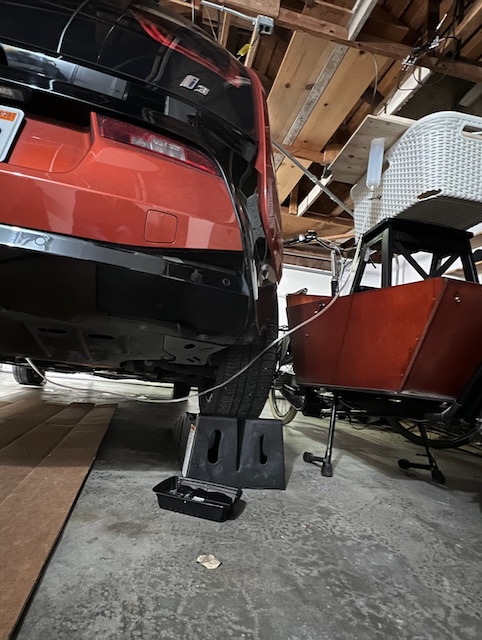
Yes, that’s right; we BMW i3 owners are having to IV-drip oil into our cars because BMW ditched its fill plug. As you saw above, I already drained my diff (and only got 300 mL); luckily the metal filings on my magnetic drain plug didn’t look any worse than others’, though my car only has 25,000 miles.
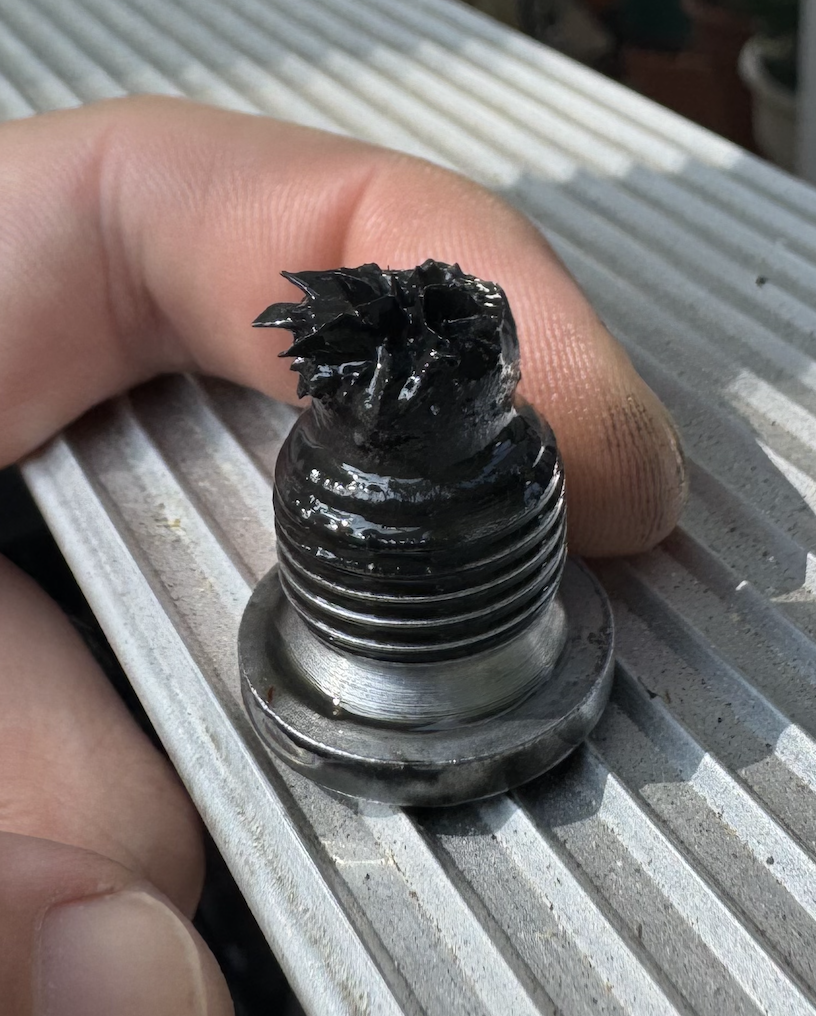
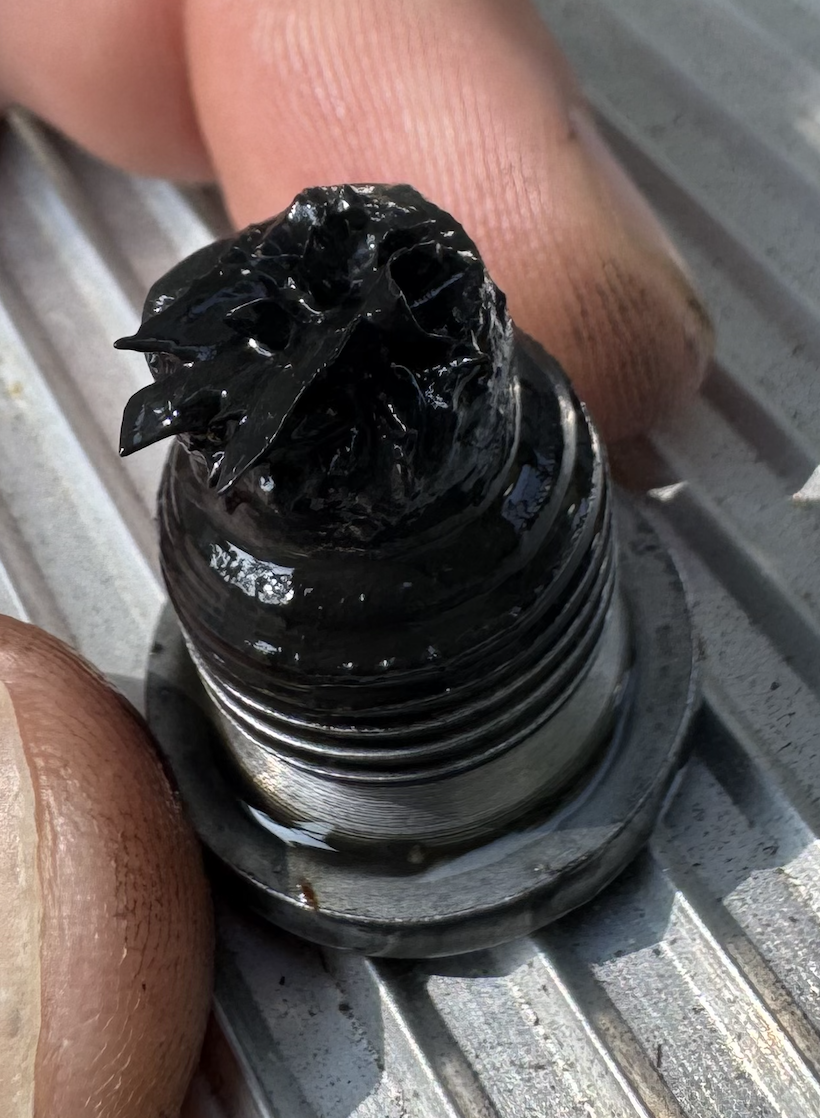
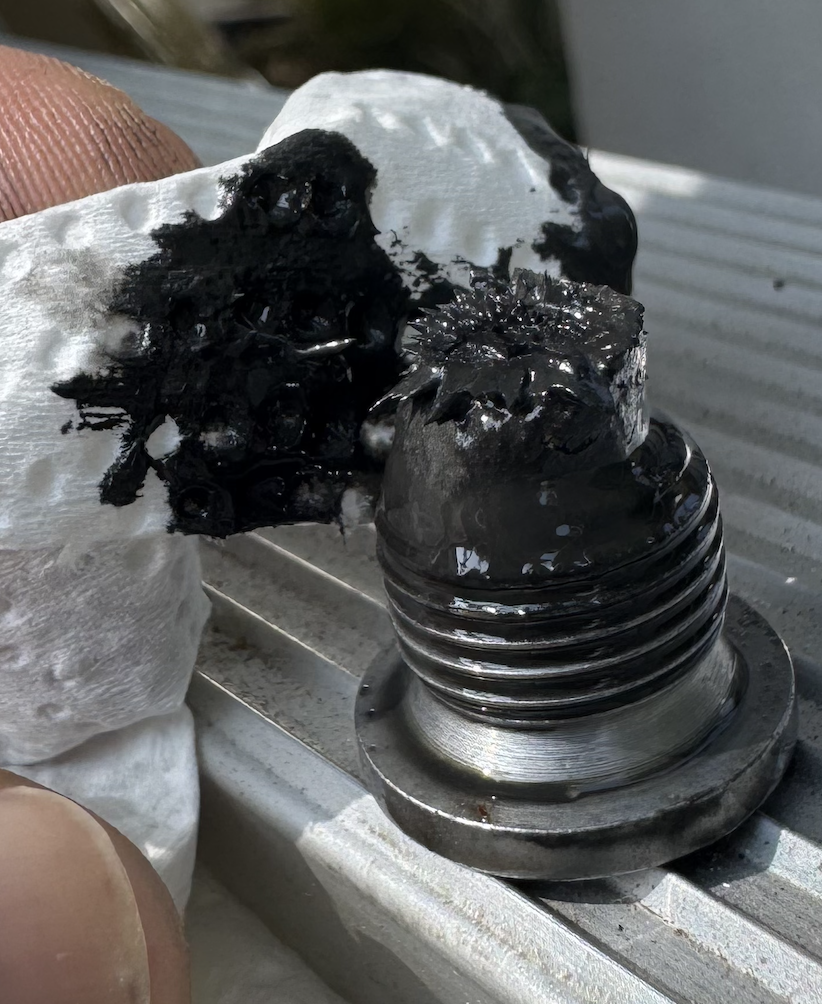
Anyway, here’s my setup:
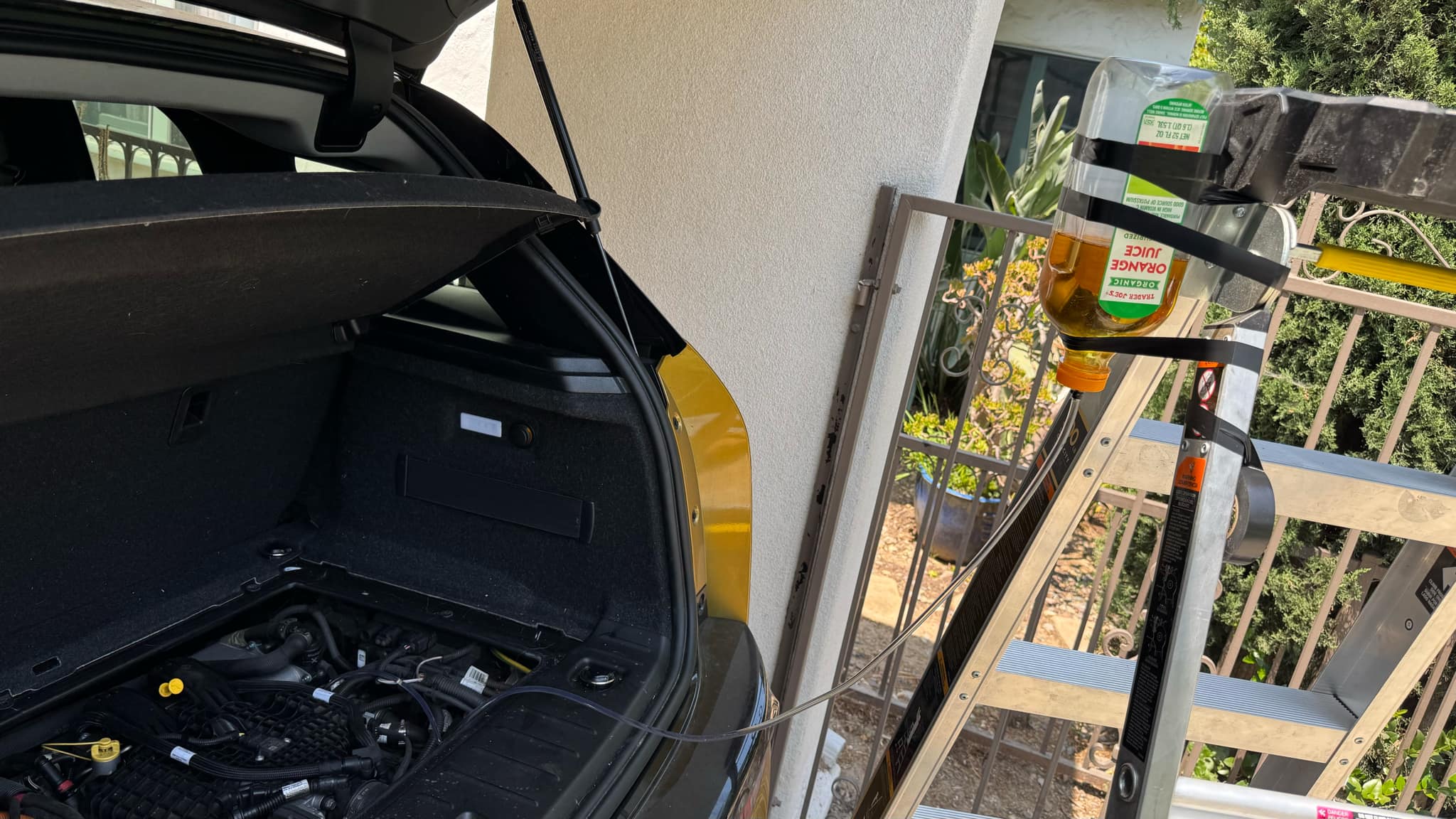
I’ll let you know how it goes. In three hours.
[UPDATE: Looking closely at the fluid entering my diff, I notice brass particles! Where can this possibly be from? The oil was new! Surely it can’t be corroding the brass fitting on the orange juice container that quickly, can it? Have a look:
I’m confused. -DT]
[UPDATE: It was a poorly-made brass nipple. Blast out your funnels/hoses/barb fittings with brake cleaner ALWAYS, folks! I usually do; I forgot this time and it bit me! -DT]

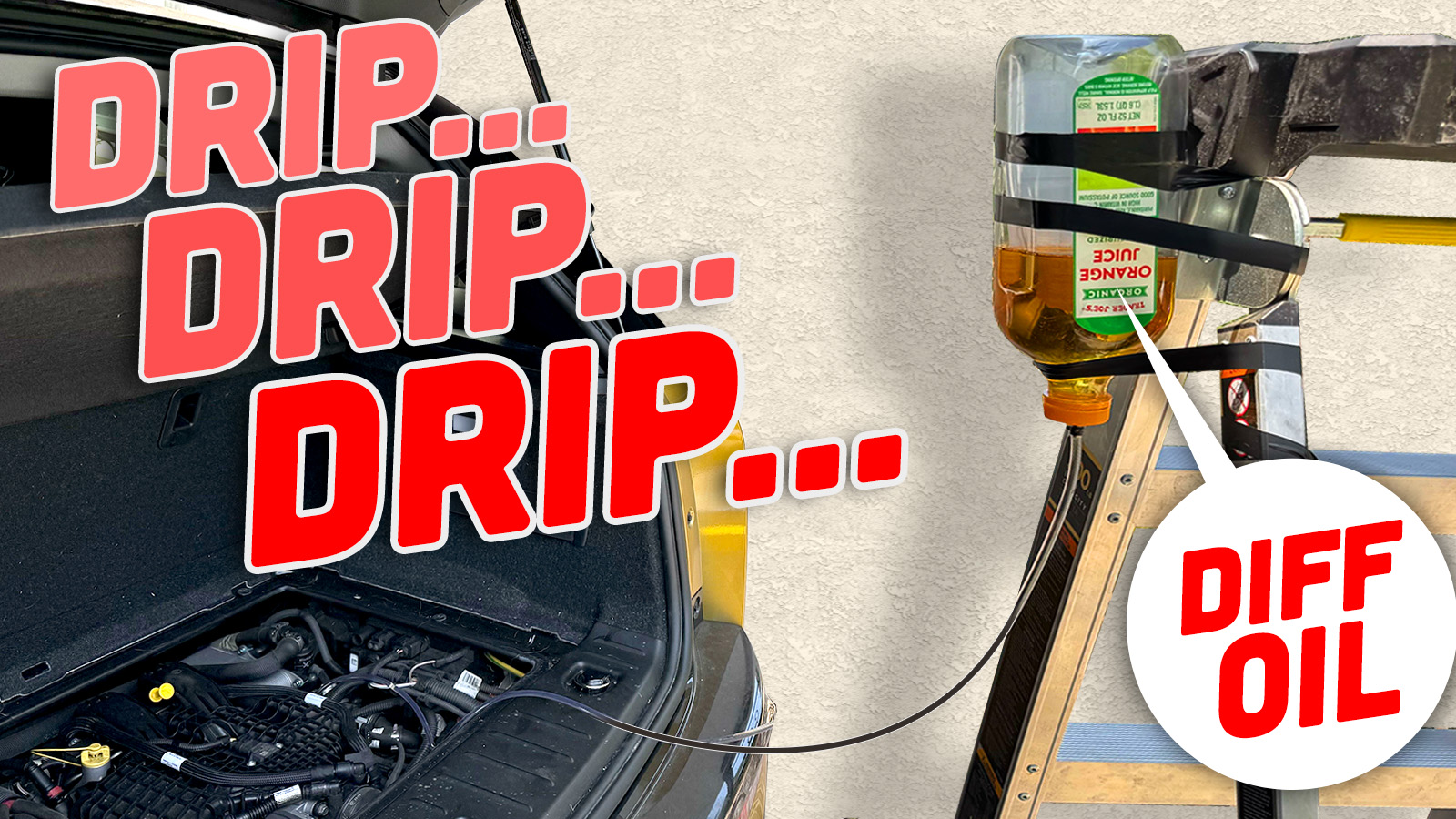







“ It’s Taking Me Three Hours Just To Pour Oil Into My BMW i3 Because…”
… I decided taking the the drive shaft out as BMW recommends was too much effort so I’ve used this aftermarket device instead, which has a couple of compromises.
…while introducing non-ferrous metallic particles in with the new fluid.
Poor guy! Pouring oil into a BMW i3 shouldn’t feel like performing surgery. Can’t believe BMW deleted the fill plug. Three hours for a fluid change is just cruel.
So, at 60K, a few months ago, my Honda told me it was time to swap out the ATF. That and this article got me to thinking about how the helicopters I flew in had chip sensors in their transmissions, that when enough little ferrous particles got attracted to a magnetic sensor, a light would show up on the instrument panel and it might be a good idea to find a place to land pretty soon.
I don’t know how much brass is in a Honda transmission or that of a Bell 206 and I could well be wrong, but I don’t think brass is ferrous. So, I don’t know how you can easily know when the brass bits are going bad.
I mean, it’s brass. I’m not certain it’ll be a problem with hardened differential gears.
I was actually wondering how much harm tiny brass fragments could do. I was even wondering if it could be so finely ground by the (much harder) gears that it would act as a solid lubricant like moly or graphite, I’m far from a metallurgist though…
After reading your articles for years and years now I have decided that you are a glutton for punishment. On a different subject, congrats on your new family! You will now deem rusted out vehicles unsafe for human consumption.
His recent article about the J10 proves this to be a lie.
DT, I need some blocky red arrows indicating the early-models’ clearly obvious fill plug placement and the obviously clear late-models’ absence thereof. You got me playin’ “one of these things is not like the other” and I just want to be sympathetically enraged.
Way back when, I needed to add trans fluid to my VW squareback. It was winter and cold outside, so I placed my quarts of 90w fluid between my waterbed and the outer wall to warm that thick stuff up. It did work to thin it.
Are you gonna drain it again? I also, for some reason, don’t think it could hurt it. It’s…. brass. That’s soft, and sometimes a lubricant.
I concur. I’m not really worried about it, but I’ll do a drain and re-fill it with fresh stuff for good measure.
You should have used a no pulp OJ container. That’s definitely too much pulp in that fluid.
Engineering switched our front wheels over to “lubed for life”. I asked what that mean, and they said the lube would last for the life of the bearing. Problem is that as part of the change, when they removed the fill port/plug, they also removed any way to check the level. So, if you get any seepage from the seals, you know you have lost some lube, but never know how much is left in the wheel.
Well David, at least BMW decided that it’s not a subscription service.
Vehicles are becoming too reliable, they used to need a lot more service a lot more often. The manufacturers have to get creative to find ways to get you to trade them in, or at least visit the dealer service department.
Could be worse, instead of plain ol’ thick gear oil it could be pitch.
There’s famously an informal experiment at the University of Queensland, Brisbsne, Australia, where a professor of physics poured heated pitch into a sealed funnel in 1927, allowed the pitch to settle for 3 years, and cut the seal off the funnel in 1930 to let the pitch start dripping into a beaker; they’re currently waiting for the tenth drop to fall: http://www.thetenthwatch.com/
In a surprising bit of synchronicity several other universities have had similar pitch drop experiments running for about the same length of time:
https://en.m.wikipedia.org/wiki/Pitch_drop_experiment
Thank you for sharing the links! I’ve been going down a rabbit hole with my morning coffee reading all about the longest continuously running science experiment.
I wonder if since it says lifetime and doesn’t specify lifetime if this part did lose oil and caused the car to die would you be able to sue them as defrauding the buyer?
If the car is now dead, the oil has lasted the lifetime of the car.
Logic aside: if it came to court BMW would provide the data from successful completion of accelerated lifetime testing.
This would prove that they have done a reasonable amount of work to ensure their claim is true.
I’d like to see how they handle the PR of proving to a court their fancy German engineering has the expected useful lifetime of a 1980s Hyundai.
Probably the same way they handled the PR of all their cars being ugly and the coolant systems falling to bits, which was to shrug it off and somehow continue to be successful.
Inertia can last only so long. Unless it’s in a perfect vacuum, then it can go on forever.
Let’s hope they have to start making E34 535is again to rebuild that reputation.
E30 M3s and 318s would be welcome too.
This is something I would do for sure. I miss small, but vital steps on a regular basis.
Brass may be soft, but I’d want to flush every last bit of it out, lest it cause erosion. Because it’s brass and thus not going to stick to the magnet, and with the lack of any filter, those little shavings are going to be flying around with every mile driven.
Random observations:
Hot oil flows faster
Why not one of these for the drain plug?? https://www.ezoilchangevalve.com/store/c2/EZ_OIL_DRAIN_VALVE.html
How about putting the oil in one of these with the appropriate hose fitting replacing the spray head?
https://www.harborfreight.com/32-oz-refillable-pressurized-sprayer-59544.html
We had an oil pumping thing thing on the farm of similar principle. Good for getting lube into a place that is blocked by stuff you are too lazy to to dissemble.
Yes, I was going to say some people sell holes and the plugs to go in them, because of precisely this sort of nonsense.
And what if you decide to mount a temperature sender?
Like my lawn tractor that always overheats the hydro trans.They deleted the drain plug but recommend you change fluid by completely removing the rear and tipping it upside down to drain the fluid.You got me once Cub Cadet…never again.Theae companies do anything to save a nickel with no regard to the buyer.
Congratulations! You’ve been Jatcod!
The tooling change to the case will cost more than they will save by thrifting the drain plug at i3 production volumes. Wahnsinn.
Looks like a sand investment cast aluminum housing, so the change is whatever it cost for engineering to remove the boss from the wax mold, and then you save the cost from including a fill plug. Stupid yes, saving cost also yes unfortunately. As part of my job every bolt I can remove from a vehicle saves approximately $80k/year. New/modified parts to enable the change is an engineering sunk cost and the physical change is usually less than 50k in tooling.
Sounds like you and I are both in the auto biz — your numbers track with my experience. The thing I would add is there is CAD work, FEA modeling, testing / recertification of the case. All in, I don’t think they’re saving anything on this low-volume vehicle. F150 volumes? A different ball game. But no matter what — a poor choice to hamper what should be a simple service procedure.
I completely agree and absolutely hate the anti-repair direction automakers are heading in the name of cost savings. It’s a race to the bottom to extract as much short term profit margin as possible, assuming people will continue buying our vehicles anyway without fail.
This is right up there with BMW no longer providing owner access to service manuals for (at least) their motorcycles, forcing the Interwebs to hive-write their own wiki manual. For. Shame.
Not even for viewing online?
Which I hate, BTW. I feel manufacturers should offer owners either free or very, very deeply discounted subscription rates to their tech sites, or a PDF version of the FSM for around $100-200. That’s low enough that I’d buy my own rather than download a pirated one online.
But they don’t, so I’ll order one that’s been skimmed from their tech site by a third party, and I will not feel bad about that at all.
Correct. Am toying with the idea of a new BMW bike, and came across this issue. Apparently, not even the torque values for the oil drain plug are available to the public. But I’m not an owner (yet, anyway), so I may be misinformed.
Kind of reminds me of Toyota TechStream. This may have changed, but it only ran under Windows 95 as late as 5 years ago. I still need to get in touch with the PR department at the mothership here in Plano and ask if they could donate copies (or access thereto) to the library system
David- On the metal shavings in the new oil. Check out the MSDS on the oil, could be part of the additive package? Maybe it’s a soft metal?
Brass is pretty soft and I have heard of camera repair guys using lube with powdered brass to make steel wind gears feel smooth like brass gears but still have the strength of steel. But that’s in something that only takes a thumb worth of torque, and maybe 100,000 revolutions if you are a news photographer.
Why people continue to worship at the altar of German cars is beyond me. German cars used to be SENSIBLE. What the hell happened?
Looks like BMW took a page from Audi, which had a Quattro model that had the center diff oil filled though the drain plug, since (IIRC) the real fill plug was inaccessible once the center differ was in situ (installed in the vehicle).
As a previous BMW owner (N54 lolll) I was always baffled at the cost cutting measures they decided on whenever I was under the hood ( a lot).
BMW has fallen so far from the ultimate driving machine / German ‘reliability’ I truly don’t get it.
I own a nearly-ancient BMW motorcycle (K100). Servicing mostly anything on that machine is a dream. Designed and built to outlive us all. How far they have fallen…
It’s funny, I always get pretty irked at my vehicles that don’t have a drain plug on the differentials (supposed to remove the cover). I’ve never seen one that doesn’t have a fill plug!
This is gonna sound weird, but maybe find a ski shop, buy some toe warmers and use the sticky side to stick them to the bottle so it warms the fluid enough to thin out and move?
I used to put some thicc gear additives in some warm water to do the same.
Your looking at the problem the wrong way, just turn the car upside down and fill it that way
That’s clearly what was happening with that van at Goodwood
Just for grins, you could pour some of the new fluid from the bottle into another clear and clean container so you can inspect it more closely.